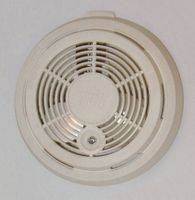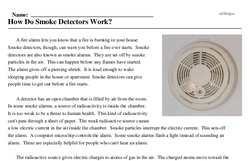How Do Smoke Detectors Work?
A fire alarm lets you know that a fire is burning in your house. Smoke detectors, though, can warn you before a fire ever starts. Smoke detectors are also known as smoke alarms. They are set off by smoke particles in the air. This can happen before any flames have started. The alarm gives off a piercing shriek. It is loud enough to wake sleeping people in the house or apartment. Smoke detectors can give people time to get out before a fire starts.
A detector has an open chamber that is filled by air from the room. In some smoke alarms, a source of radioactivity is inside the chamber. It is too weak to be a threat to human health. This kind of radioactivity can't pass through a sheet of paper. The weak radioactive source causes a low electric current in the air inside the chamber. Smoke particles interrupt the electric current. This sets off the alarm. A computer microchip controls the alarm. Some smoke alarms flash a light instead of sounding an alarm. These are especially helpful for people who can't hear an alarm.
The radioactive source gives electric charges to atoms of gas in the air. The charged atoms move toward the electrodes. Electric current flows. When there is smoke in the air, smoke particles attract some of the charged atoms. They move away from the electrodes. This makes the electric current drop and the alarm sound.




